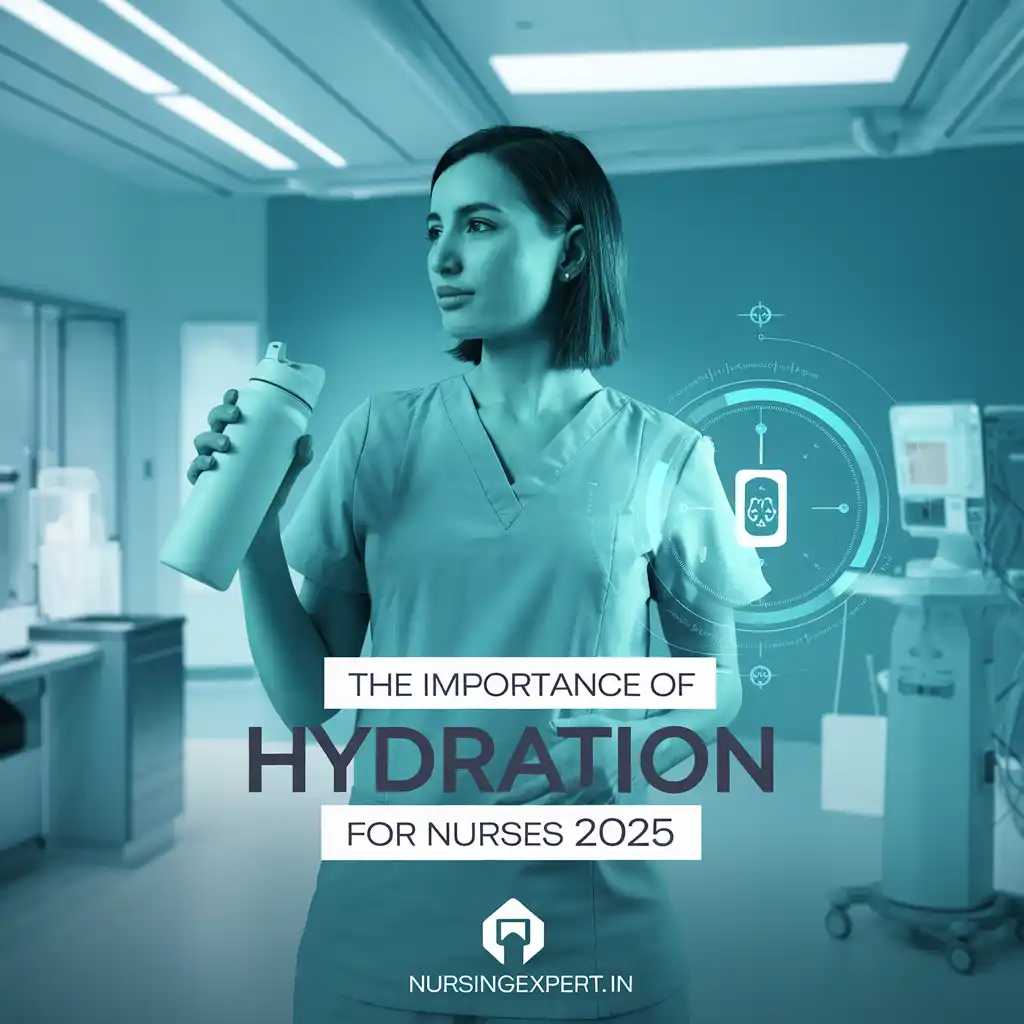Nursing is a physically and emotionally demanding profession. Amid long shifts, high patient loads, and the need to provide compassionate care, one vital factor that can often be overlooked is hydration. In 2025, staying properly hydrated is recognized as a critical element of nurse well-being, directly impacting job performance, cognitive function, and overall health. This article explores the importance of hydration for nurses and provides best practices and strategies to incorporate effective hydration into daily routines.
Thank you for reading this post, don't forget to subscribe!
Introduction
Nurses face a myriad of challenges daily, from long hours on their feet to high levels of stress and emotional demands. Amid these challenges, maintaining proper hydration can significantly enhance energy levels, cognitive function, and physical endurance. Hydration is not merely a basic physiological need; it is a key contributor to optimal performance in both personal and professional realms. For nurses, who must remain alert and responsive in fast-paced and emotionally charged environments, staying hydrated is crucial for both short-term alertness and long-term health.


In 2025, healthcare institutions are increasingly emphasizing the importance of wellness and self-care for nurses. Hydration management is now an integral part of employee wellness programs, with hospitals and clinics implementing initiatives to ensure that nursing staff have access to proper hydration throughout their shifts. The following sections detail the benefits of hydration for nurses, offer practical hydration strategies, address potential barriers, and examine future trends in hydration management.
The Benefits of Hydration for Nurses
a. Enhanced Physical Performance
- Sustained Energy Levels: Proper hydration helps maintain blood volume and circulation, enabling consistent energy levels throughout long shifts. When dehydrated, even mild physical tasks can lead to fatigue.
- Reduced Muscle Fatigue and Cramps: Adequate fluid intake supports muscle function and prevents cramping, which is common among nurses who spend long hours on their feet.
- Improved Endurance: Hydration is critical for the efficient delivery of oxygen and nutrients to working muscles, enhancing physical stamina during physically demanding tasks.
b. Improved Cognitive Function
- Concentration and Decision-Making: Dehydration negatively impacts cognitive abilities. Nurses rely on quick thinking and sound judgment, so maintaining optimal hydration supports clear, effective decision-making.
- Memory and Alertness: Proper hydration can enhance memory retention and improve overall alertness, which is crucial when managing complex patient care situations.
- Stress Reduction: Hydration contributes to a balanced mood and reduces the severity of stress responses, helping nurses remain calm under pressure.
c. Emotional and Mental Well-Being
- Better Mood Regulation: Studies have shown that dehydration can lead to irritability and anxiety. Adequate hydration helps stabilize mood, promoting a more positive outlook.
- Reduced Burnout Risk: Managing stress levels effectively through proper hydration can contribute to decreased risk of burnout, thereby supporting long-term career satisfaction.
- Enhanced Resilience: With improved mental clarity and energy levels, nurses are better prepared to handle the emotional demands of their work.
d. Overall Health Benefits
- Prevention of Health Complications: Hydration reduces the risk of complications such as kidney stones, urinary tract infections, and cardiovascular stress.
- Boosted Immune Function: Proper fluid intake supports immune function, reducing the likelihood of infections that can disrupt both personal health and the ability to provide care.
- Faster Recovery: Staying hydrated aids in the recovery from minor injuries and physical exertion, helping nurses bounce back quickly from the rigors of the job.
Strategies for Maintaining Hydration
a. Incorporate Hydration into Daily Routines
i. Scheduled Fluid Intake:
- Set Regular Reminders: Use mobile apps or smartwatches to set reminders to drink water throughout the day. Scheduling hydration breaks during shifts can help ensure consistent fluid intake.
- Keep a Reusable Water Bottle: Carry a water bottle at all times to make it easier to take regular sips between tasks. Choose bottles with measurement marks to track daily consumption.
ii. Create a Hydration-Friendly Workplace:
- Accessible Water Stations: Advocate for accessible, well-stocked water stations in nurse break areas.
- Encourage Workplace Wellness: Engage your workplace in hydration challenges or wellness programs to foster a culture of self-care.
b. Optimize Fluid Choices
i. Prioritize Water:
- Healthy Beverage Choices: While water is the best option, include other hydrating fluids like herbal teas or diluted fruit juices for variety.
- Limit Sugary or Caffeinated Beverages: Minimize drinks that may dehydrate the body, such as excessive coffee, soda, or energy drinks.
ii. Balanced Electrolytes:
- Electrolyte Solutions: For high-intensity shifts or in situations of excessive sweating, consider beverages with electrolytes to replenish vital minerals.
- Nutrition and Hydration: Pair fluid intake with a balanced diet rich in fruits and vegetables, which naturally provide hydration and essential nutrients.
c. Leverage Technology and Digital Tools
i. Hydration Tracking Apps:
- Mobile Health Applications: Use apps that track fluid consumption, set personalized hydration goals, and send alerts when it’s time to drink.
- Integration with Wearables: Some smart devices can monitor hydration status through parameters like activity level and body temperature, providing valuable feedback.
ii. Telehealth and Virtual Support:
- Online Wellness Programs: Participate in digital wellness initiatives offered by your organization that include hydration education.
- Virtual Challenges: Join or create online communities or challenges that encourage sustained hydration and overall wellness.
d. Educate and Empower
i. Patient Education Analogies:
- Leading by Example: Share personal hydration tips with colleagues and patients, emphasizing the importance of regular fluid intake for health.
- Mentorship: Encourage experienced nurses to mentor newcomers, demonstrating effective self-care strategies including hydration.
ii. Training Sessions:
- Workshops on Self-Care: Attend or organize workshops and seminars that address the importance of hydration and overall nurse wellness.
- Resource Distribution: Provide digital and printed materials that outline best practices for hydration management.
Addressing Challenges to Effective Hydration
a. Time Constraints
- Overcome Workload Pressures: Nursing shifts can be incredibly busy, making it challenging to maintain hydration. Time management strategies, such as scheduling short hydration breaks, can help overcome this challenge.
- Digital Reminders: Utilizing technology, such as hydration tracking apps with reminders, helps ensure that even during hectic shifts, nurses receive prompts to drink fluids.
b. Environmental and Workplace Factors
- Temperature and Comfort: In busy clinical settings, extreme temperatures can exacerbate dehydration. Ensure that work areas are kept at comfortable levels, and facilities provide sufficient access to water.
- Supportive Culture: Foster a workplace culture that values self-care. When leaders model good hydration habits, it encourages staff to follow suit.
c. Personal Habits
- Individual Differences: Recognize that hydration needs vary according to individual metabolic rates, activity levels, and health conditions. Tailoring hydration goals to meet personal needs is essential.
- Hydration Education: Continuous education on the benefits of proper hydration can help shift personal habits and reinforce the importance of consistent fluid intake.
Future Trends in Hydration Management for Nurses
a. Integration of Advanced Wearable Technology
- Smart Hydration Monitors: Future devices may provide real-time feedback on hydration status, adjust recommendations based on activity levels, and sync data seamlessly with health apps.
- Personalized Hydration Goals: Wearable technology will enable personalized hydration targets that adapt dynamically to individual needs and environmental factors.
b. AI-Driven Digital Health Innovations
- Predictive Analytics: AI algorithms will analyze patterns in nurse activity and environmental conditions to predict hydration needs and remind users proactively.
- Customized Digital Alerts: Future apps may use machine learning to provide tailored recommendations, ensuring optimal fluid intake for each nurse’s unique physiology and workload.
c. Enhanced Organizational Wellness Programs
- Comprehensive Wellness Platforms: Healthcare organizations will invest in integrated wellness programs that combine physical activity, nutrition, and hydration management.
- Policy Reforms: There will likely be a stronger emphasis on employee self-care policies, with dedicated time and resources allocated to promoting hydration and overall wellness.
d. Interdisciplinary Wellness Collaborations
- Team-Based Initiatives: Collaboration across disciplines—nurses, dietitians, and occupational therapists—will lead to more robust and sustained wellness programs.
- Community Engagement: Expanding community-based wellness initiatives can provide additional support and resource-sharing for hydration and other self-care practices.
Frequently Asked Questions (FAQs)
Q1: Why is hydration important for nurses?
A: Hydration is essential for maintaining energy, cognitive function, and overall physical health. For nurses, who work long shifts and face high levels of physical and emotional stress, proper hydration can prevent fatigue, reduce the risk of injury, and improve performance and patient care.
Q2: What are some common signs of dehydration?
A: Signs include dry mouth, decreased urine output, dark yellow urine, fatigue, dizziness, and headaches. These symptoms may interfere with a nurse’s ability to perform effectively and safely.
Q3: How can nurses incorporate hydration into their busy schedules?
A: Nurses can integrate hydration by carrying a reusable water bottle, setting reminders on their smartphones or smartwatches, and taking short hydration breaks during shifts. Digital apps can help track intake and send alerts.
Q4: What role do digital tools play in hydration management?
A: Digital tools—such as mobile apps and wearables—help monitor fluid intake, remind users to drink water, and provide personalized recommendations based on activity levels and environmental conditions.
Q5: How does workplace culture affect hydration practices?
A: A supportive workplace culture that values self-care encourages nurses to prioritize hydration. When organizational leaders promote wellness initiatives and provide accessible water stations, it helps all staff maintain proper hydration.
Q6: What are some future trends in hydration management for nurses?
A: Future trends include the integration of advanced wearable technology, AI-driven personalized hydration recommendations, comprehensive digital wellness platforms, and increased organizational policies that support nurse well-being.
Q7: How can nurses educate colleagues about the importance of hydration?
A: Nurses can share best practices through peer mentoring, wellness workshops, and by modeling effective hydration habits. Educating colleagues reinforces the benefits of proper hydration and promotes a culture of care for oneself as well as for patients.
Conclusion
Proper hydration is a foundational aspect of nurse well-being and professional performance. In 2025, as the demands on nurses continue to evolve, maintaining adequate fluid intake is more important than ever. By integrating digital tools, adopting efficient self-care strategies, and fostering a supportive workplace culture, nurses can ensure that they remain energized, focused, and healthy. A robust focus on hydration not only benefits nurses individually but also enhances patient care by allowing nurses to perform at their best.
The future of hydration management promises exciting advancements in technology and organizational support. AI-driven devices, personalized digital health tools, and comprehensive wellness programs will further empower nurses to maintain optimal hydration levels, ultimately leading to improved health outcomes and a more resilient healthcare workforce.
Investing in hydration is investing in overall health. With effective strategies and continued innovation, nurses can build healthier habits, reduce fatigue, and enhance both professional performance and personal well-being. As we move forward into 2025 and beyond, prioritizing hydration will remain a key component of nurse self-care and excellence in patient care.
References and Sources
- American Nurses Association (ANA). (2023). Nurse Well-Being and Self-Care Strategies. Retrieved from https://www.nursingworld.org
- Centers for Disease Control and Prevention (CDC). (2024). Hydration and Health Guidelines. Retrieved from https://www.cdc.gov/nutrition
- Journal of Clinical Nursing. (2023). Impact of Hydration on Nurse Performance. Retrieved from https://journals.lww.com/jcn
- Institute for Healthcare Improvement (IHI). (2022). Employee Wellness in Healthcare. Retrieved from https://www.ihi.org


